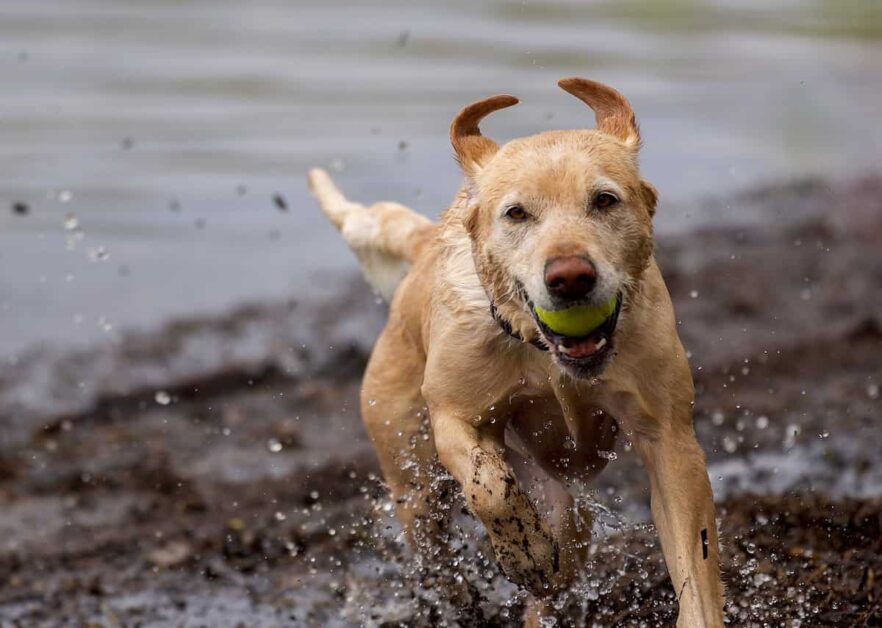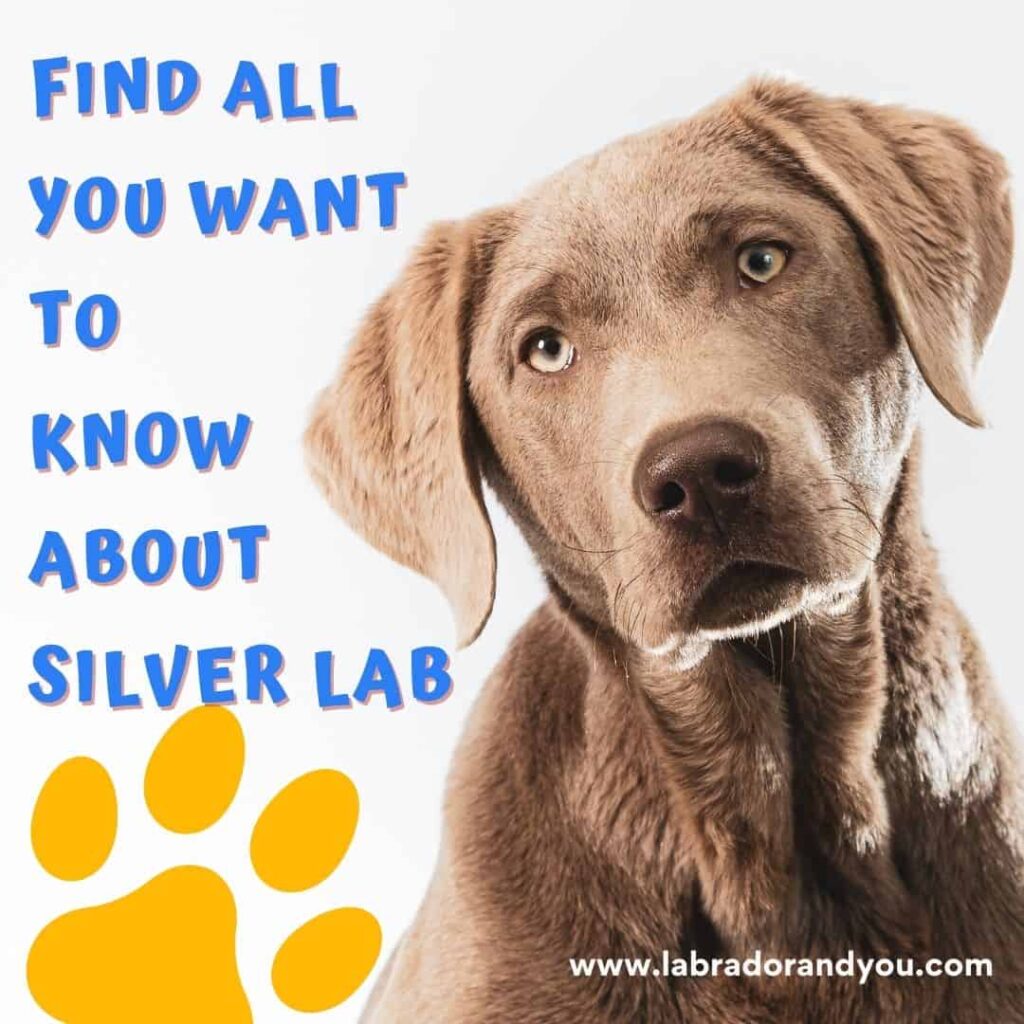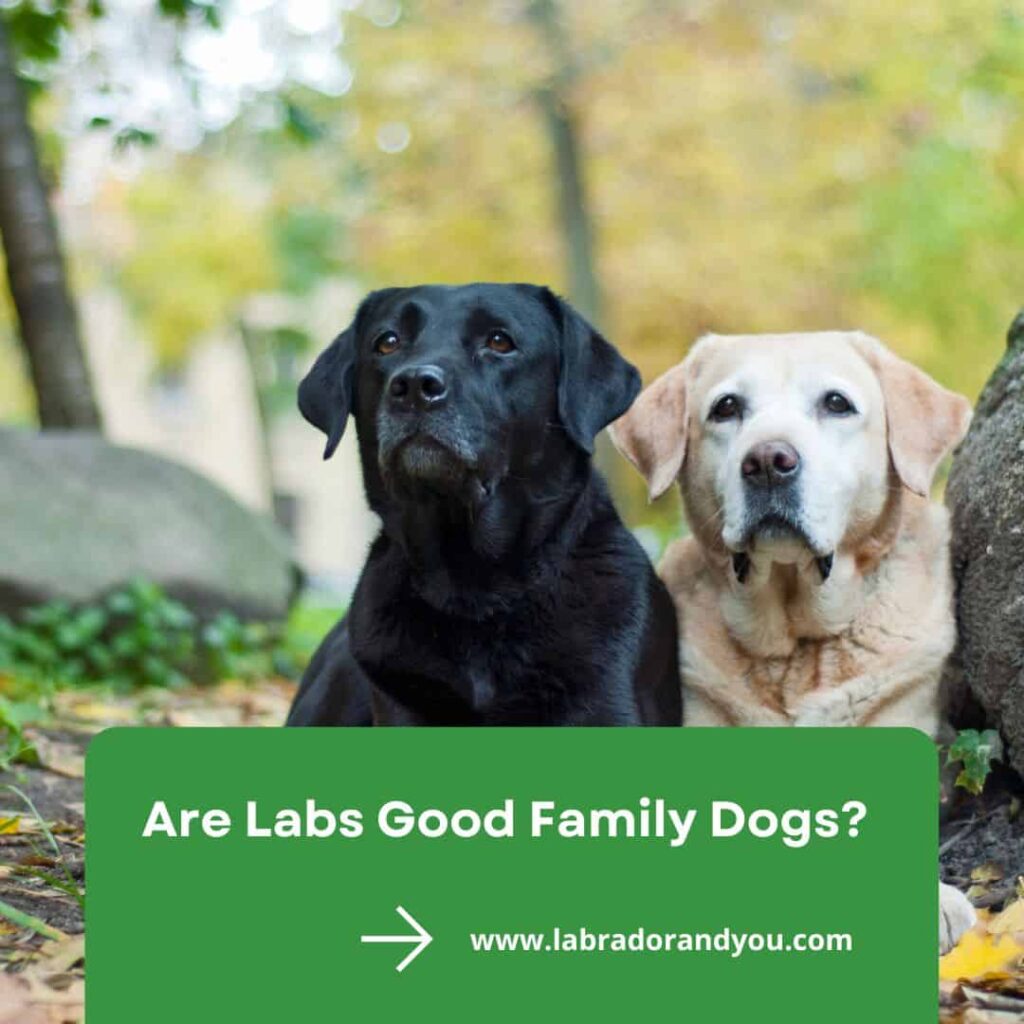Have you ever caught your dogs eating grass like there’s no tomorrow? It’s a common sight, but it can be concerning. So wondering, “why is my dog eating grass like crazy”? Is it harmless? Generally speaking, it is harmless if not done too much. Giving them a physical examination helps and look out for other symptoms.
Many dogs may eat grass excessively due to nutritional deficiencies, an upset stomach, unusual behaviors, or their natural instinct to forage and explore.
What Are the Reasons behind dog suddenly eating grass like crazy?
There are many reasons why your pup loves to graze, from dietary supplements to gastrointestinal diseases and even behavioral problems.
Nutritional Deficiencies
Dogs eating grass may lack the necessary nutrients in their diet. This is a common reason behind dogs suddenly eating grass.
Lack of enough fiber and other essential vitamins and minerals can make your dog feel unfulfilled after meals, leading them to seek additional nutrition.
If you suspect your dog may have a nutritional deficiency, address this immediately. Consult your veterinarian about adjusting your diet or adding a supplement to prevent dogs from eating grass. Ensure sufficient protein, carbohydrates, fat, and fiber.
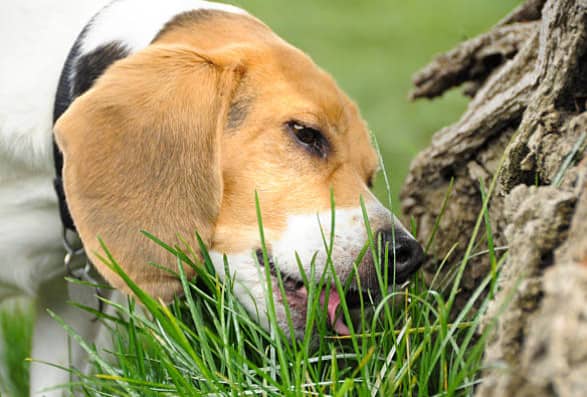
Stomach Upset
Dogs with upset stomachs may turn to eating grass to induce vomiting and soothe their discomfort. However, this can lead to digestive issues if done excessively. Common signs of an upset stomach in dogs include vomiting, diarrhea, gas, and bloating.
If your dog is exhibiting signs of an upset stomach and eating grass, get a consult to rule out any serious medical conditions.
Monitor closely as it could pose potential risks such as choking or intestinal blockages due to ingesting large amounts of indigestible material in some grasses. It can even cause internal bleeding.
Dog’s Behavioral Issues
Behavioral issues can also be a factor in why dogs eat grass excessively. Some develop compulsive behavior like excessive grass eating due to boredom or anxiety.
They may even have an underlying medical condition they’re trying to alleviate through grass consumption.
Observe your dog’s behavior and identify patterns of when eating grass. Provide activities for stimulation as it can help address behavioral issues leading to a dog suddenly eating grass.
Natural Instinct
Dogs have a natural inclination towards hunting and foraging. Eating grass can be a part of this innate instinct.
Back in the day, wild dogs consumed plants and ate grass. Domesticated ones may do the same out of this inherent drive. Some dogs may eat grass simply because they enjoy it. The texture and taste may appeal to their taste buds
Breeds can have a stronger connection with this behavior due to their genetic history or lineage, making it more likely for them to eat grass.
Is Excessive Grass Eating Harmful To Dogs?
Excessive grass eating can harm dogs. They can suffer from digestive issues and potential risks such as choking or obstruction in the gut.
Identification Of Harmful Substances
Identifying the harmful substances your dog may consume while munching on grass is best.
Plant toxins include chemicals like pesticides, herbicides, and fertilizers. Certain grasses, such as Bermuda and Johnson, cause irritation and digestive problems.
If you notice your dogs eat grass from areas treated with pesticides or herbicides, prevent them from doing so immediately.
Create a safe area for your pet to play in to minimize the risk of accidental poisoning. Pet-friendly fertilizers and natural alternatives will keep pets and lawns healthy without harming them.
Potential Risks Such As Choking And Digestive Issues
When a dog eats grass quickly, it may gulp down long blades, which can potentially cause choking and breathing problems.
Some dog vomits as they have difficulty digesting the grass blades’ fibrous material.
Always be vigilant while dogs are outside grazing on grass. Monitor their behavior closely if you see a dog vomit on the grass.
Analysis Of Common Grasses And Their Effects
Not all grass is the same; some are harmful to dogs. Poisonous plants can wreak havoc to the dog’s stomach.
Foxtail grass, for instance, can cause serious injury if ingested as its sharp seeds burrow into a dog’s skin or organs.
Similarly, Bermuda grass contains silica that can irritate the stomach lining and cause digestive issues in pets.
Wheatgrass is entirely safe for dogs and is even beneficial for their health. It contains vitamins A and E, iron, magnesium, and calcium, which help digestion and nutrient absorption.

How To Address Excessive Grass Eating Behavior In Dogs
Consult With A Veterinarian
Before addressing excessive grass-eating behavior in dogs, seek advice from a veterinarian. A professional opinion is a must to determine whether the behavior is innocuous or more serious.
Consulting with your veterinarian provides insight into any underlying issues, such as dietary deficiencies or gastrointestinal problems.
Adjust The Dog’s Diet
If the vet rules out any underlying health issues, work on adjusting the dog’s diet. For instance, adding more fiber or switching to a brand that meets dietary restrictions will help
Always read food labels to ensure a high-quality dog diet. Your pup must eat consistently throughout the day rather than grazing.
Proper nutrition is the key to addressing any nutritional deficiencies. Offering healthy treats such as baby carrots or apple slices curbs your dogs need to chew and munch without triggering excessive grass ingestion behaviors.
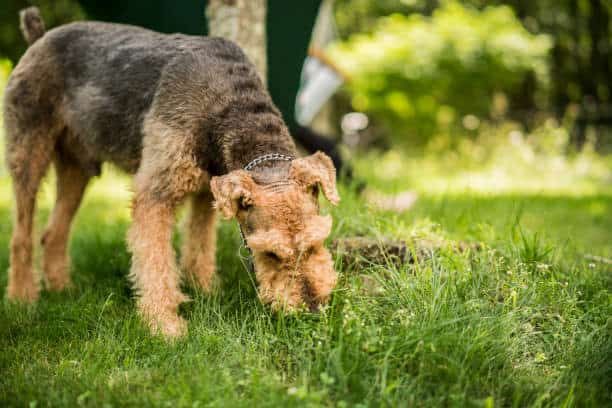
Offer Alternative Activities For Stimulation
If your dogs eat grass excessively, provide them with alternative activities that can stimulate their minds and bodies.
Playing hide-and-seek, walking in the dog park, or throwing a ball can keep them engaged. You can try adding variety to their routine by changing where they go on walks or practicing new tricks.
Moreover, providing challenging puzzle toys like Kong Classic Dog Toy filled with peanut butter can help keep dogs stimulated.
Mental stimulation through obedience training sessions helps a lot. By teaching new tricks like sit-stay-come-roll over or basic commands like “fetch,” your dogs stay entertained.
This reduces stress levels, and they have an enjoyable time. Different breeds require various amounts of daily exercise depending on their energy levels and age.
Dogs are social animals who thrive in environments filled with love and attention from their dog owners.
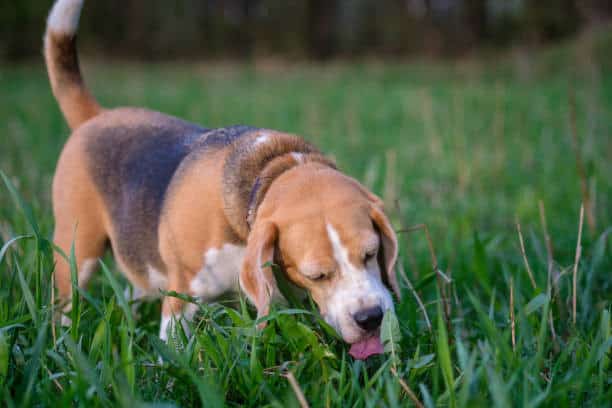
FAQ: When dogs eat grass
Is it normal for my dog to eat grass?
Yes, it is completely normal for dogs to eat grass. Some do it to relieve an upset stomach or just out of curiosity.
Why does my dog eat grass like crazy?
There could be several reasons your dogs eat grass excessively, including boredom, anxiety, dietary deficiencies, gastrointestinal issues, or simply enjoying the taste.
Can eating too much grass make my dog sick?
Too much grass can lead to vomiting, diarrhea, inflammatory bowel disease, or intestinal parasites.
How can I prevent my dog from eating too much grass?
Prevent excessive grass consumption by providing plenty of mental stimulation through interactive toys that engage them mentally.
Also, ensuring your pet has a balanced diet with proper nutrients may reduce the urge to graze on greens outside their food bowl.
Conclusion
From an upset stomach and unusual behavior to natural instincts and dietary deficiency, there are several reasons why your furry friend might be munching away on blades of grass. Always consult a veterinarian if you notice abnormal or concerning signs such as vomiting, coughing, or gulping. We can ensure our canine companions remain healthy and happy with proper care and attention!
Author Profile
- Site Owner And Dog Lover
-
Aritra, the founder of Labradorandyou.com, is a lifelong dog lover whose passion ignited for Labradors for their loyalty and intelligence. With extensive research and personal experiences, Aritra has become a Labrador expert, offering a rich resource on the breed. Labradorandyou.com provides reliable, timely, and evidence-based information, including Labrador-specific product reviews, training techniques, and care tips.
Labradorandyou.com was born out of Aritra's passion and his desire to share his profound knowledge about the breed. The site serves as a comprehensive resource, offering a wealth of up-to-date information for Labrador owners and enthusiasts alike
Also by the author
-
 Lab-TypesNovember 17, 2023Old Dog Seizures: Causes, Symptoms, and Treatment Options
Lab-TypesNovember 17, 2023Old Dog Seizures: Causes, Symptoms, and Treatment Options
-
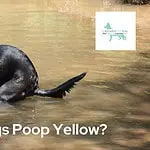 Lab-TypesNovember 17, 2023Why Is My Dogs Poop Yellow? 8 Reasons & Solutions
Lab-TypesNovember 17, 2023Why Is My Dogs Poop Yellow? 8 Reasons & Solutions
-
 ReviewsNovember 17, 2023The Only Hill’s Science Diet Review You Need To Read
ReviewsNovember 17, 2023The Only Hill’s Science Diet Review You Need To Read
-
 Lab-TypesNovember 17, 2023How To Adopt An Emotional Support Dog?
Lab-TypesNovember 17, 2023How To Adopt An Emotional Support Dog?
